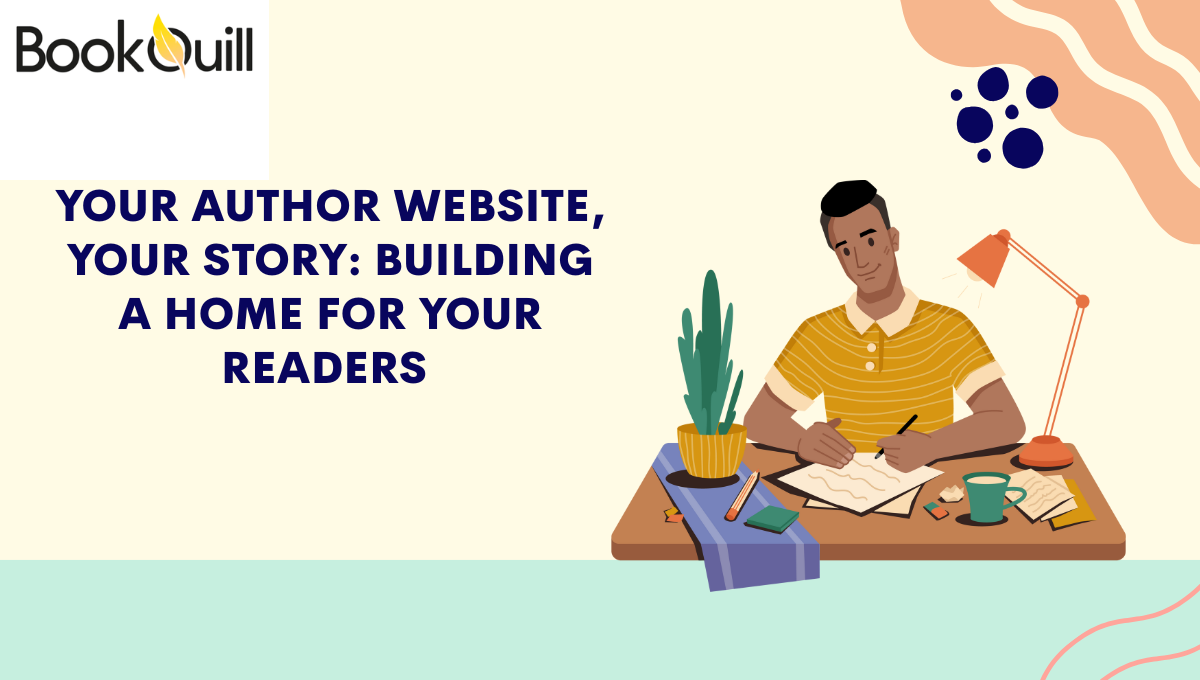Your Author Website, Your Story: Building a Home for Your Readers
I woke up at 6:00 a.m. It was the middle of June, the wind was howling as I walked through...

I woke up at 6:00 a.m. It was the middle of June, the wind was howling as I walked through the corridor to the kitchen, my mind spinning with thoughts of my books and my future in the writing industry.
Half-awake, I grabbed a cup and made myself some coffee. While doing the usual morning chores, my eyes landed on my laptop. A notification had popped up—it was from a company offering “Top Author Website Design Services in the USA.”
At first, I scoffed. Why would I need a website? I’m not running an e-commerce store or offering tech services. But as I read through the email, one line stood out: “Every author needs a website.”
That hit something.
So, I followed that gut feeling and booked a consultation. That moment kicked everything into gear. They explained why a author website matters and what I’d gain from it—and they weren’t exaggerating. They built my author site, and since then, my book sales have taken off.
In this blog, I’ll break down everything I’ve learned so you can take advantage of it too.
Why Authors Need a Website — Period
You’re Not Just a Writer, You’re a Brand
Think of it this way: you’re building a real business from the ground up. And for that, you need a brand—an image that actually reflects who you are. Not like those soulless, corporate setups built on greed. This is different. This is personal. Your name, your voice, your genre, your vibe—they come together to create something people can actually connect with. A author website gives you the power to shape that image, instead of leaving it to outdated social media or random Google results. And here’s the kicker: when readers connect with your brand, they don’t just buy one book—they come back for the next. And the next.
Control the Narrative
Every author knows the power of a good story—but many forget they’re the ones writing their own. An author website frees you from relying on platforms like Amazon, Goodreads, or social media to define who you are. Those places serve their own interests, not yours. With a website, you control the spotlight. You decide what’s front and center: your bio, your books, your updates, your voice. It becomes your digital home base—a space that reflects you, where readers can step in, look around, and feel like they know the person behind the pages.
Algorithms Can’t Save You Forever
One of the best lessons I learned from those affordable author website design services is this: Depending on Amazon’s algorithm or Instagram’s reach is a gamble. One day you’re visible, the next you’re buried. And if you’re not actively building your own digital foundation, you’re one tweak away from disappearing. That’s why a website is critical—it’s not subject to someone else’s rules. It works while you sleep, ranks on Google, grows your email list, and keeps your audience connected, no matter what’s trending.
What That Website Should Actually Include
The Non-Negotiables
There are a few must-haves that every author website should include—no matter your genre, goals, or experience level. First, your author bio: one short version for quick reads, and a slightly longer one for folks who want to dig deeper. Add a professional photo—not a blurry selfie or a 10-year-old headshot from LinkedIn. Then, make sure you have dedicated pages for each of your books, with cover images, back-cover blurbs, purchase links, and reader reviews if you’ve got them. Don’t forget a contact form so readers, bloggers, or event organizers can reach you, and links to your social media if you’re active elsewhere.
Optional But Powerful Add-Ons
Once the essentials are in place, there’s room to level up your author website. A blog can be a powerful tool to show your voice, share behind-the-scenes content, or offer tips to fellow writers. It keeps your site fresh and gives readers a reason to come back. A media kit—with your bio, high-res images, press mentions, and interview topics—makes you look polished and press-ready. If you’re building a community, adding a newsletter opt-in is gold. It gives you a direct line to your audience without relying on social media algorithms.
Don’t Worry — You Don’t Have to Build It Alone
Most authors aren’t web developers—and they don’t need to be. The goal isn’t to become a tech wizard overnight. The goal is to get your site live, functional, and working for you.
Hire Smart, Not Fancy
You don’t need Mark Zuckerberg building your site and charging five figures while pitching you on “brand synergy.” What you do need is someone who understands authors. Look for designers—or small teams—who specialize in author websites. They know what readers care about, how to structure your book pages, and how to build a clean, compelling site without all the fluff. Some of the best website designers for authors aren’t flashy—they’re tucked away in quiet corners of Google or freelancing on platforms like Upwork. Just one warning: avoid Fiverr unless you’re cool with paying premium for a generic template ripped straight from Envato.
My Experience with Top Author Website Design Services
When I first got that email from Top Author Website Design Services, I rolled my eyes. I wasn’t running a tech startup—why would I ever need a website? But as I read through, it actually started to make sense. They didn’t hit me with hype or fake urgency. They just laid it out straight: clean homepage, book pages, a blog, and an email opt-in. No fluff, no marketing mumbo jumbo. Just what I needed. I booked a call, they got to work, and the rest is history. My site’s been bringing in visibility and boosting sales ever since. Honestly? Best move I’ve made for my writing career.
Conclusion: Your Website, Your Legacy
The writing world is no longer just about ink and imagination. It’s about visibility, ownership, and connecting with your readers beyond the last page of your book. An isn’t a vanity project—it’s your virtual handshake, your billboard, your bookstore, your voice when you’re not in the room.
It doesn’t need to be flashy. It needs to be you—strategic, simple, and soulful. Don’t wait for the algorithm gods to favor you. Build your own altar. Whether you’re just starting or deep in your career, your author site is your home on the web. Let it reflect your story. Let it welcome readers in.
Technical? Branding? I Got Answers
1. Do I need a website if I already have social media?
Yes. Social media is rented land; your website is owned property. Algorithms can shift, but your site stays standing, always working in your favor.
2. How much does an author website cost?
It ranges. DIY platforms like WordPress or Squarespace can cost $100–300/year. Hiring a designer might run $500–$3,000, depending on complexity and features.
3. What if I’m not tech-savvy?
You don’t need to be. Many designers specialize in author websites, and platforms like WordPress offer plug-and-play options. Focus on content—let pros handle the code.
4. How many pages should my site have?
Start with 4–6: Homepage, About, Books, Contact, Blog (optional), and a Newsletter signup. More can be added later.
5. Can a website really help book sales?
Absolutely. A polished site builds trust, ranks on Google, supports media outreach, and gives readers a clear path to purchase.



